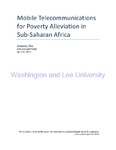| dc.rights.license | In Copyright | en_US |
| dc.creator | Cho, Johanna | |
| dc.date.accessioned | 2013-11-06T13:02:30Z | |
| dc.date.available | 2013-11-06T13:02:30Z | |
| dc.date.created | 2013 | |
| dc.identifier | WLURG38_Cho_POV_2013_wm | |
| dc.identifier.uri | http://hdl.handle.net/11021/24070 | |
| dc.description | Johanna Cho is a member of the Class of 2013 of Washington and Lee University. | en_US |
| dc.description | Capstone; [FULL-TEXT FREELY AVAILABLE ONLINE] | en_US |
| dc.description.abstract | Mobile telecommunications or mobile telephony is the enormous network of telephone services for portable phones, ranging from smartphones with monthly subscriptions and full Internet capabilities to pre-paid low-end phones with no Internet capabilities. Traditionally used as a one-to-one voice communication device, mobile phones have been developed and refashioned for multifunctional, innovative purposes all across the world and especially so in developing regions. In particular, the simple pre-paid cell phone has been praised as an affordable innovative tool in improving the quality of life. The world is enamored by the explosive growth in the use of mobile telecommunications, especially so in sub-Saharan Africa. Perhaps there is intrigue because the media has never pegged the region as an innovator of modern technology; hence, any progress is sensationalized and viewed as a miracle. From a differing perspective, the continent has successfully harnessed the more economical commodities of the mobile telecommunications industry to include members of all socioeconomic levels in the advancement. The majority of sub-Saharan African countries have taken advantage of pre-paid low-end phones to construct a non-traditional network of communication penetrating urban cities and beyond to rural areas, a type of area where approximately 75% of the world's impoverished population live on less than $2 a day.1 While this is a widely accepted notion, the point of contention is the extent to which mobile telecommunications growth has actually made an impact on the reduction of poverty on both a macro regional or national level and a micro community level. The overwhelming majority of sub-Saharan mobile telephony is composed of affordable pre-paid services, the choice of mobile phone service for many rural poor. Thus, it is worthy to explore the impact the mobile telephony growth in sub-Saharan Africa on the multiple facets of poverty, especially rural poverty.
This paper analyzes the impact of mobile telecommunications growth in five countries considered to be key mobile markets in sub-Saharan Africa: Kenya, Tanzania, Ghana, Nigeria, and South Africa. All countries have liberalized their mobile telephony industry, ultimately driving down the cost of mobile phones and services to achieve affordability and accessibility, and have experienced the highest rates of investment to expand their markets.2 The overall impacts of mobile telephony growth on poverty reduction will be examined on the five national economies as a whole as well as on the micro community level. The effects of mobile growth on GDP and employment are vital to understand its relationship with overall national poverty; however, a micro-perspective can lend more specific information that can incite more or better poverty-alleviation programs. A discussion on the areas of banking and business practices, health care and access, and political society will be used to discover the potential of the mobile telephony expansion to promote income earnings as well as human capability to ultimately alleviate poverty in sub-Saharan Africa. | en_US |
| dc.description.statementofresponsibility | Johanna Cho | |
| dc.format.extent | 35 pages | en_US |
| dc.language.iso | en_US | en_US |
| dc.rights | This material is made available for use in research, teaching, and private study, pursuant to U.S. Copyright law. The user assumes full responsibility for any use of the materials, including but not limited to, infringement of copyright and publication rights of reproduced materials. Any materials used should be fully credited with the source. | en_US |
| dc.rights.uri | http://rightsstatements.org/vocab/InC/1.0/ | en_US |
| dc.subject.other | Washington and Lee University, Shepherd Poverty Program | en_US |
| dc.title | Mobile Telecommunications for Poverty Alleviation in Sub-Saharan Africa | en_US |
| dc.type | Text | en_US |
| dcterms.isPartOf | RG38 - Student Papers | |
| dc.rights.holder | Cho, Johanna | |
| dc.subject.fast | Capabilities approach (Social sciences) | en_US |
| dc.subject.fast | Cell phone systems | en_US |
| dc.subject.fast | Sub-Saharan Africa | en_US |
| dc.subject.fast | Health services accessibility | en_US |
| dc.subject.fast | Political participation -- Technological innovations | en_US |
| local.department | Shepherd Poverty Program | en_US |
| local.scholarshiptype | Capstone | en_US |
